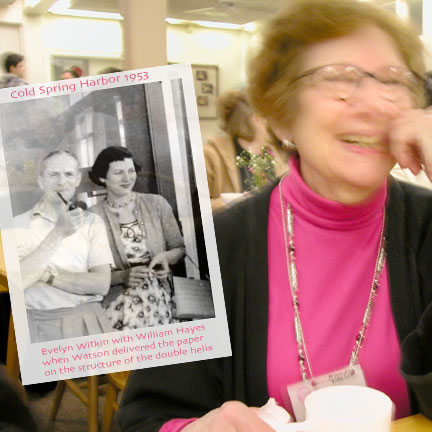|
|

Dr. Evelyn Witkin, a geneticist who identified mechanisms of
DNA repair and recombination through experiments on bacteria, spent
the early days of her career at Cold Spring Harbor. We spoke with
her before the opening session of the final day of the conference.
She told us how she came to Cold Spring Harbor, what it was like
to work with the founders of molecular biology, becoming friends
with Barbara McClintock, and her current projects.
"I was halfway through my graduate work at Columbia when I
came to Cold Spring Harbor," Witkin said. "The reason
I came here was because I had just read a paper by [Salvador] Luria
and [Max] Delbruck that suddenly convinced everyone that bacteria
had genes just like everyone else and could be used for genetics.
Luria and Delbruck were among the people who were here that summer,
and my professor at Columbia suggested that if I was so excited
about bacteria, I should come out here and learn how to handle bacteria
from Luria and do my Ph.D. research with bacteria instead of
Drosophila
[fruit flies]. So I did work with Luria and met
Barbara
McClintock
, and we became very close friends."
Witkin had originally intended to return to Columbia after that
summer to resume her research there, but Columbia wasn't set up
to study microorganisms. That wasn't the only happy accident of
Witkin's career. While an undergraduate at New York University in
1941, Witkin and several of her college compatriots were outraged
by a "gentlemen's agreement" with southern schools to
keep their black athletes out of the games. When NYU prevented its
star football player, Leonard Bates, from playing at a game at the
University of Missouri, Witkin and six others started petitions
and led protests with the slogan, "No Missouri Compromise,
Bates Must Play!"
The university responded by suspending the seven leaders of the
protest. Witkin couldn't graduate with her class and lost her graduate
position for the fall. "It was the best thing that could've
happened," she said. "I went to Columbia, met Professor
Dobzhansky, and ended up at Cold Spring Harbor." Sixty years
later, NYU finally apologized by honoring the "Bates Seven"
at an annual campus dinner.
After Cold Spring Harbor, Witkin continued her genetics research
with bacteria at Rutgers University, using UV radiation to study
the question of mutations and DNA repair. She continued to make
many important discoveries in her field. Witkin retired from research
in 1991, but is still active in genetics. She serves on the Advisory
Board of the Department of Molecular Biology at Princeton. She's
also taken up a project that bears the distinctive stamp of her
old mentor, Luria. "He always insisted that we be well rounded,"
Witkin said, "insisting that we meet once a week to discuss
great works of literature and poetry." And Witkin has taken
his advice to heart. She's returned to an old love, literature,
trying to find connections between two of her favorite Victorians,
Robert Browning and Charles Darwin.
To some, the connection might not appear obvious. "I found
something that no one could have known about Darwin unless they
went through Browning," Witkin said. "And nobody's crazy
enough to link Darwin and Browning except me." What she found
was a children's book that influenced them both enormously. "It
was a book that was supposed to give a broad picture of human nature,
of what humans are capable of. It was a collection of quotations
that showed the best and worst of human beings, published in 1678.
It was full of human physical and mental variations."
Witkin said Darwin talked about this book in his autobiography,
and thinks that it may have sensitized him to variations. Following
a number of clues, and testing her hypotheses, Witkin believes that
even though Darwin said the book he read was
The Wonders of the
World
, it was really the same book that Browning read,
The
Wonders of the Living World
. The librarian in his hometown told
her that the first edition of the book was available in Darwin's
day, and that no book called
The Wonders of the World
was
published in England until much later. Making these connections
was a lot like doing science, Witkin said. She may have left scientific
research behind, but she never lost her scientific approach.
|
|

